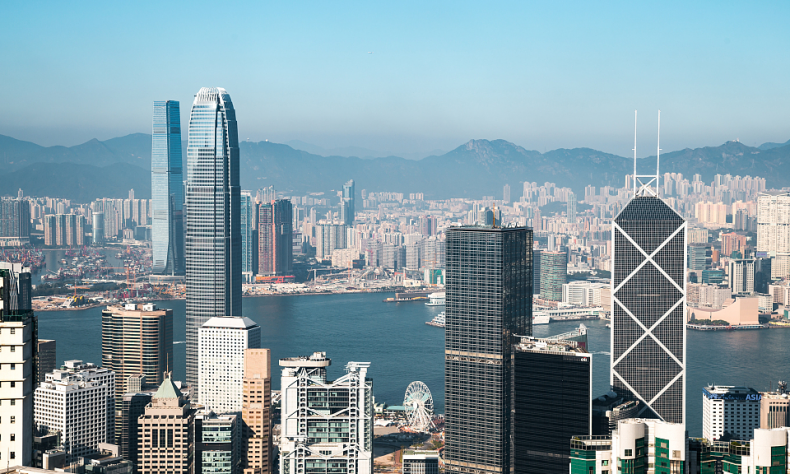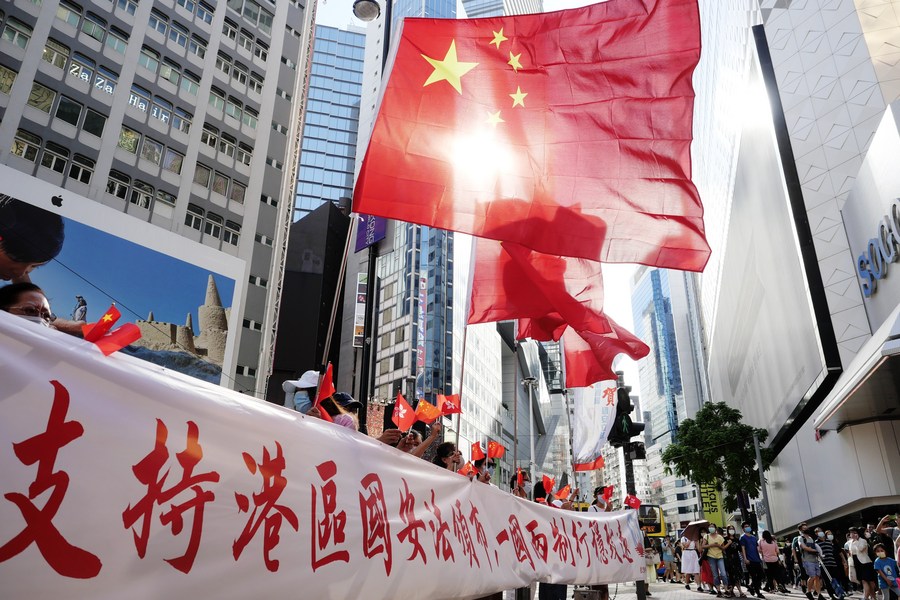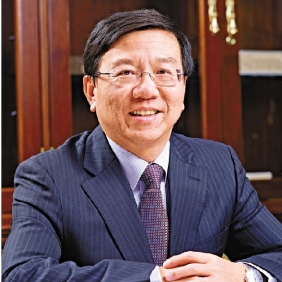Why the Principle of Patriots Governing Hong Kong Is So Important?

Hong Kong should be governed by Hong Kong people who are patriots who respect China and national sovereignty and whose actions do not harm the prosperity and stability of Hong Kong, leaving no room for anti-China radicals or separatists. Such a provision ensures that the ‘one country, two systems’ policy will be properly upheld.
The principle of “patriots governing Hong Kong” is not new to the people of Hong Kong. It was first expressed by the late Chinese leader Deng Xiaoping decades ago. According to Deng Xiaoping, “the boundary and criterion for Hong Kong people governing Hong Kong is that Hong Kong must be governed mostly by patriots”.
Although the threshold of being a patriot – to respect his or her own nation, to wholeheartedly support the motherland’s restoration of its sovereignty over Hong Kong and not to harm the prosperity and stability of Hong Kong – is not high, this principle has not been diligently implemented and its related systems had not been firmly established.
What is “patriots governing Hong Kong”?
In the midst of this, anti-China disrupters and separatists in Hong Kong have, with support from external forces, taken various steps to oppose the Central Government, inciting discontent toward the Mainland, obstructing the government of Hong Kong and undermining the well-being of Hong Kong citizens over the past few years. Such intentions are evident in notable events such as the “Occupy Central Movement” in 2014, the “Mong Kok Riot” in 2016 and the “Anti-extradition Bill Riot” in 2019.
In response to this situation, the Central Government issued a White Paper on The Practice of “One Country, Two Systems” in Hong Kong Special Administrative Region (HKSAR) in 2014, in which it reiterated the principle of “patriots governing Hong Kong”. In 2016, the Interpretation of Article 104 of the Basic Law was also passed at the 24th Session of the Standing Committee of the 12th National People’s Congress. This provision stipulates that “an oath taker is disqualified forthwith from assuming the public office specified in the Article if he or she declines to take the oath. An oath taker who intentionally reads out not in accordance with the wording of the oath prescribed by law, or takes the oath in a manner which is not sincere or not solemn, shall be treated as declining to take the oath. The oath so taken is invalid and the oath taker is disqualified forthwith from assuming the public office specified in the Article.”
Another notable action taken by the Central Government, to date, is its promulgation of the Law of the People’s Republic of China on Safeguarding National Security in the Hong Kong Special Administrative Region at the 20th Session of the Standing Committee of the 13th National People’s Congress. Article 6 (3) of this law stipulates that “a resident of the Region who stands for election or assumes public office shall confirm in writing or take an oath to uphold the Basic Law of the Hong Kong Special Administrative Region of the People’s Republic of China and swear allegiance to the Hong Kong Special Administrative Region of the People’s Republic of China in accordance with the law.”
At an annual work report by Carrie Lam, the Chief Executive of Hong Kong, to the Central Government on January 17, 2021, President Xi emphasized that the “patriots governing Hong Kong” principle was of fundamental importance to HKSAR governance, and as such, must be constantly be upheld to ensure the gradual and steady implementation of “one country, two systems”.
On February 22, 2021, when addressing a high-level symposium on Hong Kong affairs, Xia Baolong, vice chairman of the National Committee of the Chinese People’s Political Consultative Conference and head of the Hong Kong and Macao Affairs Office of the State Council, further stressed that the authority to govern Hong Kong must be only be vested in patriots.
He further elucidated on the standards required of patriots, in that they commit to the safeguarding of national sovereignty, security and development interests and do not engage in activities that endanger national security; respect and uphold the fundamental values of the State and the constitutional order of the special administrative region; strive to maintain the prosperity and stability of Hong Kong.

Why is the principle so important?
As known, Hong Kong Island as Chinese territory was occupied by the then British Empire during the Opium War in 1840. In the following one and half century, Britain further expanded its ruling from Hong Kong Island to Kowloon and New Territories by forcing the then Qing governemnt to sign a number of unjust treaties.
It was on December 19, 1984, that the Chinese and British Governments reached the Sino-British Joint Declaration, affirming that the Government of the People’s Republic of China will resume the exercise of sovereignty over Hong Kong with effect from July 1, 1997.
It is against this unique historical backdrop, that Hong Kong was accorded the status of a special administrative region within the territory of China and was allowed to maintain its capitalist system for as long as the “one country, two systems” is in place.
It is important to note that this policy was established for two purposes, to uphold national unity and territorial integrity, and to maintain prosperity and stability of Hong Kong. In essence, “one country, two systems”, should be understood as “one country” before “two systems”, in that recognition of the sovereignty of China is the precondition of the operation of capitalist system in Hong Kong.
In other words, Hong Kong is still, by nature, a local administrative region directly under the jurisdiction of the Central People’s Government. In that relation, Hong Kong cannot be considered as an independent political entity, and its rights to a “high degree of autonomy” (which includes, but is not limited to administrative power, legislative power, independent judicial power and the power of final adjudication) are granted by the National People’s Congress of China.
If we turn to the Basic Law, whilst it stipulates that Hong Kong should be governed by Hong Kong people, this serves to mean that the city should be governed by public servants who are patriots who respect China and national sovereignty and whose actions do not harm the prosperity and stability of Hong Kong, leaving no room for anti-China radicals or separatists. Such a provision ensures that the “one country, two systems” policy will be properly upheld.
How to implement the principle?
Under the principle of “patriots governing Hong Kong”, one major requirement is that all public servants shall confirm in writing or take an oath to uphold the Basic Law and swear allegiance to HKSAR in accordance with the law. Article 104 of the Basic Law and the Interpretation of Article 104 of the Basic Law in 2016 lists out five categories of public officers, i.e., Chief Executive, principal officials, members of the Executive Council and of the Legislative Council, judges of the courts at all levels and other members of the judiciary. However, Article 104 of the Basic Law is not inclusive and it leaves room for other laws to define the scope of public officers.
Article 6 of the National Security Law further stipulates that a resident of the Hong Kong Special Administrative Region who stands for election or assumes public office shall confirm in writing or take an oath to uphold the Basic Law and swear allegiance to HKSAR in accordance with the law. In accordance with this Article, on February 26, 2021, the government of HKSAR gazetted the legislation related to the amendments regarding the oath-taking requirements for public officers. According to the bill, the oath-taking requirement is also applied to District Council members.
Furthermore, the bill will introduce restrictions in Chief Executive, Legislative Council and District Council elections such that people who have been disqualified from entering an office for declining or neglecting to take an oath, breached an oath or failed to fulfill the legal requirements and conditions, would be disqualified from being nominated or elected in the relevant elections held within five years.
It is reasonable to foresee that more actions will be taken by Hong Kong people and government to ensure that only patriots can govern Hong Kong. These may include the establishment of a central institution to judge the authenticity of a patriot by applying unified standards, possible seat reallocation within the Chief Executive Election Committee, and possible adjustment to improve HK electoral system in accordance with the Basic Law.
 Facebook
Facebook
 Twitter
Twitter
 Linkedin
Linkedin
 Google +
Google +



